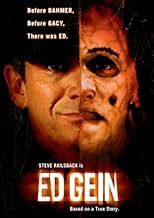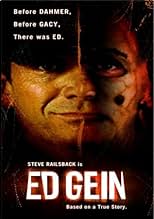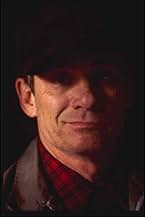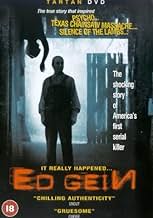IMDb RATING
5.5/10
5.7K
YOUR RATING
The story of Ed Gein, who dug up the corpses of over a dozen women and made things out of their remains before finally shooting two people to death and butchering their bodies like beef side... Read allThe story of Ed Gein, who dug up the corpses of over a dozen women and made things out of their remains before finally shooting two people to death and butchering their bodies like beef sides.The story of Ed Gein, who dug up the corpses of over a dozen women and made things out of their remains before finally shooting two people to death and butchering their bodies like beef sides.
- Awards
- 4 wins & 2 nominations total
Thomas C. Rainone
- Butch
- (as Tom Rainone)
- Director
- Writer
- All cast & crew
- Production, box office & more at IMDbPro
Storyline
Did you know
- TriviaThe scene with Steve Railsback dancing in the moonlight while wearing a woman's skin was done in a single take.
- GoofsA mountain range is seen looming over Plainfield, Wisconsin, which as its name suggests, is on a plain.
- ConnectionsFeatured in IFC Grindhouse: Ed Gein (2007)
- SoundtracksSelfish Heart
Written and performed by Ed Maxwell and Joel Sigerson
Featured review
I caught this film on cable expecting a real waste of time (hey, I wasn't busy), but was very surprised to see that there was a lot more to this movie than it seems on the surface.
Yes, 'Texas Chainsaw Massacre', 'Psycho', 'Silence of the Lambs', and numerous other films have been "loosely" based on the story of Ed. These are all far better horror movies and, with the exception of 'Psycho', depend very heavily on blood & guts. However, all three of those films were fictional accounts. There's something considerably more horrific about the fact that these events actually happened (although many names were changed to protect the innocent/dead/consumed).
Yet another case of showing what happens when children are raised without a sense of love, compassion or happiness. Jeffery Dahmer's problems had very similar origins, as did several other serial killers (and, I'm sure, many who are still out there). Instead of 'love and affection', Ed and his brother are given large doses of 'fire & brimstone'... Ed accepts this without question, although his brother does not (much to Ed's dismay), and the combination of the twisted religious concepts his mother imposed upon him (to her, there seemed to be no good in the Bible, only 'Revelations' and in particular the 'Whore of Babylon', which all other women seemed to be in her mind... upon which most of his killings are attributed to, granted through his schizophrenic delusions of his mother).
Regardless of what made him what he turned out to be, the sensationalistic qualities of the true events are better left for those who wish to learn more. This film touches on much of the creepiness, but explains little motivation (aside from his religious 'logic')... I believe this is intentional, as the movie is really telling the life story of Ed Gein rather than describing his tabloid exploits.
Oddly enough, I was not left with a feeling of disgust, repulsion or anger with Ed; Ed was a surprisingly sympathetic character that you feel more pathos for than anything else. Steve Railsback again has done a wonderful job of portraying a historical sicko (after his wild-eyed performance as Charlie Manson in 'Helter Skelter'), and is utterly convincing.
This is a psychological profile rather than a case history. They hint at several motivations in the film (his comment at the bar of "...any of y'all fellas ever considered changing your sex, like they do in Sweden?", his 'skin suit', his 'rituals' where he is attempting to resurrect his dead mother, etc), but ultimately it is simply the delusions of his mother that drive him to action... actions, which in most case, Ed really seems to object to; but being a loyal son, he obeys his mother.
They do not focus on the truly bizarre elements, such as the skull bowls or the skin lampshades, because for the most part this film is told through the mind of Ed... and these things would have been nothing special to Ed, just another hobby like books on Nazi atrocities, cannibalism, shrunken heads, and taxidermy. To him, these artifacts were simple furnishings that he didn't think twice about. I also question that the skull bowls were something that were used a lot; I believe that they were the equivalent of his 'fine china' that he brought out for special occasions (like have his next dinner over for dinner).
My wife felt that Ed should not have been found insane because he knew what he was doing was wrong. I disagree with that. While he may have known that what he was doing could get him in trouble, were he to get caught, he clearly felt that he was doing what mother told him to do, which for him was the 'right' thing to do... never mind the fact that he accepts these instructions from a delusion (compare this to Russell Crowe's character in 'A Beautiful Mind'... he has delusions as well, but he ultimately acknowledges them as delusions and can ignore them... Ed is so focused on bringing his mother back, that he wouldn't ignore his delusion even if he knew she was not real - it might seem strange to compare the two films, but I happened to see them back to back).
In the end, do we learn anything new? Not really. Do we learn anything about ourselves? Not really. Do we learn anything about human nature? Only that we seem to be fascinated with these sort of aberrations. Serial killers and mass murderers have become the 'freak show' of modern times, and it's ok to stare at them... at least, that's the way it seems. The film 'bookends' with actual footage of his neighbors at the beginning of the film talking about what a quiet, normal guy Ed was, and ends with actual footage of the real Ed being hauled away by the police.
To say that the aforementioned films were based on the life of Ed is like saying that a film about chopping down trees is based on the life of George Washington; they only take snippets of his tale. "Texas Chainsaw Massacre" takes the 'leatherface' mask, bone sculptures and indirect cannibalism (since they are selling the meat, it is a different type of cannibalism), but Ed certainly had no commercial operation; "Psycho" takes the aspects of his isolation, taxidermic skills, and the delusions of his domineering dead mother; "Silence of the Lambs" takes the cannibalism (true cannibalism, which Ed was a 'fan' of), the sexual identity issues, and the idea of dressing up as a woman (as opposed to dressing up LIKE a woman)... but none of these are as horrible as what really happened. To tell the true story of Ed Gein, in full Technicolor blood & guts, would be far more than what most audiences could stomach...
Not a bad film, not a great film. Great performance by Railsback. Best to see if you know a little bit about Ed to begin with, but not required... the actual atrocities are not as interesting as the man himself and how he came to be what he was.
Yes, 'Texas Chainsaw Massacre', 'Psycho', 'Silence of the Lambs', and numerous other films have been "loosely" based on the story of Ed. These are all far better horror movies and, with the exception of 'Psycho', depend very heavily on blood & guts. However, all three of those films were fictional accounts. There's something considerably more horrific about the fact that these events actually happened (although many names were changed to protect the innocent/dead/consumed).
Yet another case of showing what happens when children are raised without a sense of love, compassion or happiness. Jeffery Dahmer's problems had very similar origins, as did several other serial killers (and, I'm sure, many who are still out there). Instead of 'love and affection', Ed and his brother are given large doses of 'fire & brimstone'... Ed accepts this without question, although his brother does not (much to Ed's dismay), and the combination of the twisted religious concepts his mother imposed upon him (to her, there seemed to be no good in the Bible, only 'Revelations' and in particular the 'Whore of Babylon', which all other women seemed to be in her mind... upon which most of his killings are attributed to, granted through his schizophrenic delusions of his mother).
Regardless of what made him what he turned out to be, the sensationalistic qualities of the true events are better left for those who wish to learn more. This film touches on much of the creepiness, but explains little motivation (aside from his religious 'logic')... I believe this is intentional, as the movie is really telling the life story of Ed Gein rather than describing his tabloid exploits.
Oddly enough, I was not left with a feeling of disgust, repulsion or anger with Ed; Ed was a surprisingly sympathetic character that you feel more pathos for than anything else. Steve Railsback again has done a wonderful job of portraying a historical sicko (after his wild-eyed performance as Charlie Manson in 'Helter Skelter'), and is utterly convincing.
This is a psychological profile rather than a case history. They hint at several motivations in the film (his comment at the bar of "...any of y'all fellas ever considered changing your sex, like they do in Sweden?", his 'skin suit', his 'rituals' where he is attempting to resurrect his dead mother, etc), but ultimately it is simply the delusions of his mother that drive him to action... actions, which in most case, Ed really seems to object to; but being a loyal son, he obeys his mother.
They do not focus on the truly bizarre elements, such as the skull bowls or the skin lampshades, because for the most part this film is told through the mind of Ed... and these things would have been nothing special to Ed, just another hobby like books on Nazi atrocities, cannibalism, shrunken heads, and taxidermy. To him, these artifacts were simple furnishings that he didn't think twice about. I also question that the skull bowls were something that were used a lot; I believe that they were the equivalent of his 'fine china' that he brought out for special occasions (like have his next dinner over for dinner).
My wife felt that Ed should not have been found insane because he knew what he was doing was wrong. I disagree with that. While he may have known that what he was doing could get him in trouble, were he to get caught, he clearly felt that he was doing what mother told him to do, which for him was the 'right' thing to do... never mind the fact that he accepts these instructions from a delusion (compare this to Russell Crowe's character in 'A Beautiful Mind'... he has delusions as well, but he ultimately acknowledges them as delusions and can ignore them... Ed is so focused on bringing his mother back, that he wouldn't ignore his delusion even if he knew she was not real - it might seem strange to compare the two films, but I happened to see them back to back).
In the end, do we learn anything new? Not really. Do we learn anything about ourselves? Not really. Do we learn anything about human nature? Only that we seem to be fascinated with these sort of aberrations. Serial killers and mass murderers have become the 'freak show' of modern times, and it's ok to stare at them... at least, that's the way it seems. The film 'bookends' with actual footage of his neighbors at the beginning of the film talking about what a quiet, normal guy Ed was, and ends with actual footage of the real Ed being hauled away by the police.
To say that the aforementioned films were based on the life of Ed is like saying that a film about chopping down trees is based on the life of George Washington; they only take snippets of his tale. "Texas Chainsaw Massacre" takes the 'leatherface' mask, bone sculptures and indirect cannibalism (since they are selling the meat, it is a different type of cannibalism), but Ed certainly had no commercial operation; "Psycho" takes the aspects of his isolation, taxidermic skills, and the delusions of his domineering dead mother; "Silence of the Lambs" takes the cannibalism (true cannibalism, which Ed was a 'fan' of), the sexual identity issues, and the idea of dressing up as a woman (as opposed to dressing up LIKE a woman)... but none of these are as horrible as what really happened. To tell the true story of Ed Gein, in full Technicolor blood & guts, would be far more than what most audiences could stomach...
Not a bad film, not a great film. Great performance by Railsback. Best to see if you know a little bit about Ed to begin with, but not required... the actual atrocities are not as interesting as the man himself and how he came to be what he was.
- How long is Ed Gein?Powered by Alexa
Details
- Release date
- Countries of origin
- Language
- Also known as
- In the Light of the Moon
- Filming locations
- Production companies
- See more company credits at IMDbPro
Box office
- Gross US & Canada
- $5,708
- Opening weekend US & Canada
- $5,708
- May 6, 2001
- Runtime1 hour 29 minutes
- Color
- Sound mix
- Aspect ratio
- 1.85 : 1
Contribute to this page
Suggest an edit or add missing content

































